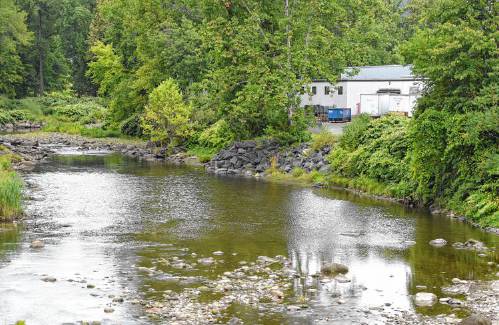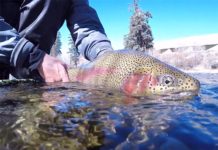COLRAIN — The cotton bleaching company allegedly responsible for the deaths of more than 270,000 fish, including rare species, after an acid spill at its Colrain facility in 2019 has agreed to pay nearly $1.5 million in settlements.
Barnhardt Manufacturing Co., based in North Carolina, allegedly spilled dozens of gallons of concentrated sulfuric acid into the North River in September 2019. The incident decimated the river’s aquatic life, with locals reporting seeing dead dace, bass, trout and longnose suckers. The settlement was announced Tuesday by state Attorney General Maura Healey, the Baker-Polito administration and the U.S. Environmental Protection Agency.
“The sulfuric acid spill caused by this company was devastating for the Colrain community and left long-lasting damage to the North River,” Healey said in a prepared statement. “Today’s settlements will hold Barnhardt accountable for harming this rich ecosystem and will provide significant funding to restore nearby natural resources and fisheries.”
The state and federal settlements will also require Barnhardt to take steps to comply with water pollution, hazard management and chemical accident prevention laws at their bleaching facility and associated wastewater treatment facility.
According to a press release from the Attorney General’s Office, 53 to 60 gallons of acid sprayed out of an outdoor above-ground storage tank at the Colrain facility, directly onto the ground, on Sept. 1, 2019. The Attorney General’s Office alleges Barnhardt knew the storage tank had a leak and neglected to repair it.
“Dozens of gallons of acid allegedly flowed into a nearby brook and down a 3-mile stretch of the North River, a pristine river and popular recreational fishery that feeds into the Deerfield River,” the statement reads. According to the complaint, the acid dissolved nearly everything in its path, damaged more than 14 acres of protected wetland resource areas and more than 12 acres of designated habitat of longnose suckers and the Ocellated Darner dragonfly — two state-listed rare species.
Barnhardt also allegedly discharged wastewater from its facility in excess of its permitted limits on several occasions, improperly operated and maintained its wastewater treatment facility, and mismanaged hazardous waste oil.
The Attorney General’s Office states Barnhardt’s acid spill and facility operations violated Massachusetts environmental laws and regulations — including the state Wetlands Protection Act, the Endangered Species Act, the Clean Waters Act and the Hazardous Waste Management Act — and “gave rise to significant damages under the commonwealth’s Oil and Hazardous Material Release Prevention and Response Act and Inland Fisheries Statute.”
Barnhardt is required by the settlement’s terms to comply with state regulations to protect water quality and natural resources at and around its facility, and to undertake additional training, planning and operations to prevent releases in the future, the press release states.
Barnhardt will pay up to $500,000 in penalties, including $200,000 to the state’s Natural Heritage and Endangered Species Fund, and will finance “the replacement and/or enhancement of one or more culverts located in the Deerfield River watershed in Colrain, at a cost of $300,000.” Also, the company will pay the state more than $360,000 to fund environmental restoration projects in the Colrain area, to compensate for the harm to natural resources and fisheries, and to reimburse the costs of assessing natural resource damages.
In a separate statement, Barnhardt President and Chief Operating Officer Lewis Barnhardt said the fourth-generation family company has taken its responsibilities seriously and has worked to address problems identified at the Colrain site, hiring experts to conduct inspections, reviews and maintenance.
“At the time of the accident, the tank was surrounded by a concrete containment structure. A small drip — at a drip rate of approximately once every five minutes — was observed around supply piping on the side of the tank in late August 2019,” he stated. “The drip was believed to be from a connection or seal and was being entirely held within the concrete containment area. The company had previously decided to replace the tank and not allow it to take any more materials.”
Later, and before the spill, the company had decided to remove the tank entirely, he said. Before that could happen, the spill was discovered and the tank was drained, dismantled and removed, according to Barnhardt.
“We have a long track record of commitment to Western Massachusetts, where many of our employees have worked for generations at our site before we owned it and whom we regard as family,” he wrote. “As a company, we have strongly supported the community over many years through annual grants to schools and nonprofits, sponsoring a local Little League team, and providing strong multiyear support for supplying food to the elderly through the Food Bank of Western Massachusetts.”
Upon learning about the settlement, Eric Halloran, the vice president and incoming president of Trout Unlimited’s Deerfield River Watershed Chapter, said he was relieved to find out Barnhardt will be held accountable.
“I think it’s great to hear that they’re going to suffer some kind of penalty and that their money is going back into endangered species,” he said. “They really needed to get a serious consequence for their negligence on this, and it sounds like our Department of Environmental Protection came through.”
Halloran, who lives on the Shelburne Falls side of the village line with Colrain, said he was the first to alert the state to the problem after noticing dead fish in the water while working on the side of his house facing the river. He said he stopped what he was doing, drove to find the source of the problem and called the state Environmental Police, which he said immediately sent a biologist to investigate.
“It was definitely a significant event that impacted people as well as the environment,” he said of the spill.
Charles Ricko, who owns Overwatch Outpost Outfitters, which recently moved to Tea Street in Charlemont and rebranded, said the spill affected his fly fishing shop and fishing guide service. He had said the acid killed countless insects and other lifeforms that inhabit the river.
“(There was) just piles of dead aquatic life everywhere,” he recalled.
Ricko, a business member of Trout Unlimited’s Deerfield River Watershed Chapter, said he hopes some of the settlement money goes to the organization, whose members, he said, have been instrumental in making the watershed what it is today.
“I think it’s actually great news. And I think it shows some goodwill on the part of Barnhardt. I’m glad that they took responsibility for it,” he said. “I think it’s a really ositive thing and I think the river … can probably be brought back to at least where it was before the spill.”
According to the state, the EPA’s administrative settlement claims the company failed to maintain its sulfuric acid tank in violation of the Clean Air Act’s General Duty Clause, which requires users of extremely hazardous substances to take steps to prevent and mitigate accidental releases. The EPA’s settlement requires a civil penalty payment of approximately $305,000 to the U.S. Treasury and work to ensure the plant’s chemical hazards are identified and addressed.
“(The) EPA’s case complements the commonwealth’s by addressing the root cause of the spill,” Deb Szaro, the EPA’s acting regional administrator, said in the press release. “It’s critical that companies handling hazardous chemicals identify hazards and ensure that their facilities are designed and maintained safely.”
The state settlement was negotiated in collaboration with the state Department of Environmental Protection and the state Division of Fisheries and Wildlife. According to the statement, the EPA brought its administrative case on a separate but parallel track.
Reach Domenic Poli at dpoli@recorder.com or 413-772-0261, ext. 262.
Credit: Source link






























